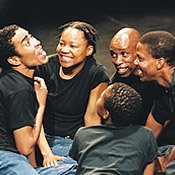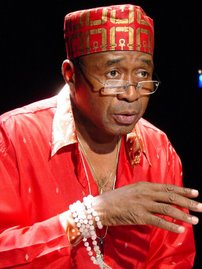WCS Director Olivia Greer wrote an interesting article about the word "feminist" for YP4 following our "Why Women Center Stage?" event, at which the panelists (Jennifer Buffett, Gloria Feldt, Aisha al-Adawiya, Idelisse Malave, Letty Cottin Pogrebin, and Carol Jenkins) sparred over the relevance/usefulness/relative "good" of the word "feminist."
"Am I a 'feminist?'" asks Olivia, whose article explores the paradox of being white and an activist in the struggle of women's rights, a struggle in which non-white women feel left behind, estranged from the feminism of Steinem et al.
As a pro-rights-for-women dude, I just want to say kudos to Olivia, and to add that of course every person, man or woman, must internalize their own, idiosyncratically-connotative definition of the word "feminist," like any other word.
But as a semantics buff and serious word nerd, I have to point out that the word itself is not the problem; no one is "not" a feminist nowdays, at least in New York. The word "feminism" means simply "the ideology that men and women should have the same rights," or however you'd like to paraphrase it.
Perhaps some Texas good ole boys or Egyptian polygamists might not label themselves as "feminist," but the vast majority of Americans will, do, can, and/or should.
I was not at all surprised when, during the "Why Women Center Stage?" conversation, panelists argued about race. I agree, white ladies have left their not-white sisters in the dirt, in terms of socio-political advancement, work opportunities, etc.
But I grew confounded as the argument seemed to return again and again to that word - "feminist." What does it mean to be a "feminist" versus "someone who believes in equal rights for women?" Why is there so much confusion surrounding what should be a simple ideological signifier?
Think about this in terms of a different argument: When I tell a conservative that I am "pro-gay marriage," he doesn't ask what I mean. He doesn't say, "do you mean that you are pro-white gay marriage, or pro all-gay marriage?" That would seem ridiculous.
Yet many prominent non-white women feel that "feminist" somehow excludes them; they are not "feminists," could never possibly be "feminists," even if they very much self-identify (whether as social or political leaders, like Jenkins and Pogrebin, or as religious organizers, like al-Adawiya) as "believers in equal rights for women."
Here is the crux of the problem: The word will continue to mean just what the word means, for a time, at least. Is is not better to educate people as to the meaning of the word than to abandon the word, invent a new term for the same thing, and thus split the "feminist" old-school white woman-equalists from the "not-feminist" non-white woman-equalists?
I'm not kicking aside the very real problems brought up by those who feel excluded by the F-word; they should absolutely bring their concerns to the forefront of the women's rights debate. But they should also admit that they, too, are technically feminists.
The problem with trying to alter language politically is that, besides from ugly-fying a beautiful natural system of sound and metaphor and meta-metaphor, it doesn't work. In fact, it often backfires.
Think of Russel Simmons' quixotic quest to delete the N-word from the mouths of thugs across America. I still hear the N-word every single day. (Or Germany's campaign to suppress Nazi propaganda, which, while noble in intent, has produced a lot of German neo-Nazis.)
Rather than focus on a problem word, we should focus on problem ideas. Ideological battles cannot and should not be won semantically; that is, if women in the hood feel estranged from "feminism," women in the Upper East & West Sides should explain what feminism, in their view is; the hood women should explain to the rich women their problems with white feminism or what they see as white feminism. I bet the two groups will find more commonality than difference, at least in terms of gender-ideas.
In general, groups fighting for the same important human rights should embrace one another, not divide and subdivide based on, of all things, a four-syllable Latin piece of jargon. New labels and new words should and will pop up, of course. As new ideas come to the front of the collective watercooler debate-circuit, their jargon will replace the previous era's.
But what better option than "feminism" is floating out there right now? Perhaps there is one. If there is, please write to us and prove my earlier argument incorrect (or out of date). But think long and hard: Is being a "feminist" really so much worse than being a "transgenderequalist" or a "equagynovoterist" or a "grrl=boi-er?"
The question could be rephrased: How can we make "feminism" a better idea, and thus a better word, since we all basically agree on what it means and why we will continue to fight for it, in its name, by whichever name it takes?
Friday, June 29, 2007
The Semantics of the Word "Feminist"
Vertices
global women,
language,
Race,
women,
women center stage,
women's movement
Subscribe to:
Post Comments (Atom)




1 comment:
This is a great post Wythe, and I couldn't agree with you more. I subscribe to the bumper sticker saying that "feminism is the radical notion that women are people." It couldn't be clearer than that.
But I do think that we - particularly those of us with the privilege to explore semantics - need to be highly aware of and sensitive to the history that some words carry with them.
If my black or latino girlfriend tells me she can't identify with the word feminist, perhaps it's a more progressive step for me to listen to her tell me why, than for me to explain to her why its important that she get over it and embrace the word for what it really means.
As Letty Pogrebin said, words are important as banners for us to stand under together. But when words become divisive, I for one think (just as I'd be ready to wave goodbye to most forms of organized religion), we should be ready and willing to find a new one.
Post a Comment